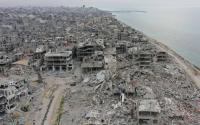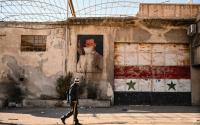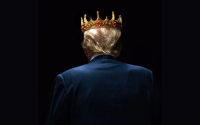Of course air travel will continue to increase: the taxpayer is funding subsidies to keep it cheap The Guardian, Friday November 23, 2001 There could scarcely be an odder time to announce a massive airport development. Even before the crash in New York 11 days ago, the world's airline companies were expecting to lose 15% of their trade and some $7bn. In the past fortnight two major carriers have collapsed. Several others seem sure to follow.
But the government knows that the long-term growth of air travel is guaranteed. It knows it because its own policies are responsible. For the industry in Britain is comprehensively underwritten by public subsidies and externalised costs. The result is inexorable pressure for new development. As airports expand, Britain - Orwell's Airstrip One - seems to be fusing into one big runway. Air traffic is out of control.
BAA, which will build and run Terminal 5, insists that the new space will allow it to handle more passengers without having to construct a new runway. Thanks to larger aircraft, the airport will be able to process 60% more people with just 8% more flights.
But in 1998 Bob Ayling, then the chief executive of British Airways, revealed: "We had imagined enormous jets... but the industry has taken a completely different direction. Long-haul jets are getting smaller, not bigger." What this means, as the transport secretary's refusal to address the issue suggests, is a third runway at Heathrow.
With companies like RyanAir offering tickets for just £1, it's not hard to see why passenger numbers have been growing. But the airlines are cheap only because we are paying by other means. According to a new study by the transport specialist Professor John Whitelegg, just 38% of British people fly in any given year, but we each pay an annual £182 to keep them in the sky.
Part of this cost comes in the form of direct subsidies from the state. Terminal 5 will generate an extra 46,000 car journeys a day. Having previously denounced the further widening of the M25 as "lunacy", in 1998 John Prescott expanded the section serving Heathrow to 12 lanes, at a cost of £1m. The new terminal could not function without the extra lanes.
Every year, the Treasury loses some £1.8bn because of the airlines' anomalous exemptions from VAT. Airline fuel is also free from domestic duty: if it were taxed at the same level as unleaded petrol, the exchequer would recover £5bn a year.
Heathrow produces 10% of all the volatile organic pollutants in Britain: if the poisoning costs now carried by the NHS were charged to the airlines, they would be paying some £1.3bn a year. Terminal 5 mocks the promises on climate change the government made a few days ago in Marrakesh. Aeroplanes are the world's fastest growing source of carbon dioxide, and their impact on world temperatures may be doubled or even quadrupled by the nitrogen oxides and vapour trails they produce.
Now the companies have demanded even more. A few days before President Bush asked US schoolchildren to each give a dollar for humanitarian aid in Afghanistan, he pledged $18bn in new state support for the airlines. Switzerland and Belgium are now arguing with the European Union over their own plans to support their airlines, while BA has been pressing the British government to defend it from the market.
The net effect of all this public expense is to make our lives more miserable. In September, the Heathrow Association for the Control of Aircraft Noise persuaded the European Court that its members were being deprived of their human right to a good night's sleep. A recent study conducted by researchers at the University of London shows that the reading ability of children living under flight paths is worse than that of children in similar economic circumstances elsewhere.
In 1998, Gordon Brown looked as if he might be prepared to withdraw Britain's public subsidy for sleep deprivation and educational impairment, when he announced a review of energy taxation. Campaigners hoped that this would support their demand for an airline fuel tax. But the man he appointed to oversee the review was Lord Marshall, the chairman of British Airways.
Some people have argued that holding down the costs of air travel permits the poor to enjoy the luxuries formerly reserved for the rich. This is true, but it's hard to see why we should be spending scarce public resources on luxuries. As the rich tend to fly more often than the poor, and as the poor are more likely to live under flight paths, public subsidies for aeroplanes are deeply regressive. Concorde, the most heavily sponsored civilian airliner in history, took off again two weeks ago to the delight of millionaires and the misery of millions, for whom it delivers only discord.
We will never be able to accommodate our airlines while we subsidise their growth. Controlling air traffic means forcing them to carry their own costs.






